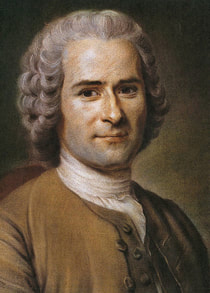JEAN-JACQUES ROUSSEAU
|
Jean-Jacques Rousseau was born on the 28th of June 1712 in Geneva, Switzerland and was always proud to be from there. Rousseau’s father had followed in the family tradition to become a watchmaker, but was skilled in many different areas, and even taught dance for a short period of time. Rousseau’s mother was from a wealthy family, but had a complicated life. She did not marry Rousseau’s father until she was 31, which was very old in those days.
Rousseau grew up surrounded by crafts people, and developed a creative mind set. His family was caring, but Rousseau was strong willed and when he converted to Catholicism as a teenager, his family, for the most part, disowned him. When he found himself alone he turned to academia and applied himself to a number of different areas of study that included math’s, music and philosophy. With so much time spent studying he developed many of his own theories, and as he became an adult he established himself as a philosopher, writer and composer. |
Rousseau’s thoughts and theories influenced the Enlightenment of many of the countries in Europe, as well as influencing the development of education, and political thought. Some of his best known works are: Social Contract, which he wrote in 1750 and the Discourse on the Origin of Inequality which he wrote in 1755. Both highlight some of his major ideas on class divisions in society and the nature of human beings. Specifically, Rousseau argued against a strong central authority in society and argued against the rigid class divisions present in feudalism. As well, he wrote about inequalities within France, and such works sparked aspects of the French Revolution. During the revolution, Rousseau was one of the most popular philosophers in the Jacobin Club, which was made up of influential and prolific philosophers of the time.
Rousseau wrote a number of autobiographical pieces, which are thought to have sparked the start of the modern autobiography. Other works, such as his reveries, were excellent examples of how the 18th century was moving into the ‘Age of Sensibility’. Rousseau died on the 2nd of July 1778, and was interred as a national hero in Paris in 1794.
Rousseau wrote a number of autobiographical pieces, which are thought to have sparked the start of the modern autobiography. Other works, such as his reveries, were excellent examples of how the 18th century was moving into the ‘Age of Sensibility’. Rousseau died on the 2nd of July 1778, and was interred as a national hero in Paris in 1794.

